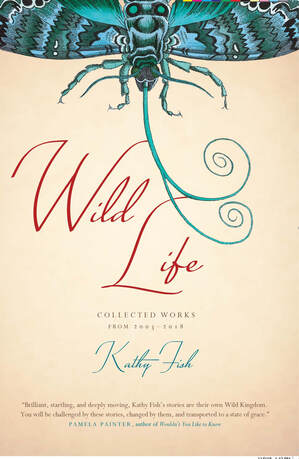Wild Life by Kathy Fish
Publisher: Matter Press (2018)
Purchase @ Matter Press
Review by Andrea Rinard.
You can insert your own cliché: size matters, good things come in small packages, small ones are sweeter, cut down to size...
The truth is that Kathy Fish’s flash and micro fiction collection, Wild Life, is like a handful of gemstones, each one unique, brilliant, and carefully cut and polished. Originally published in such journals as The Jellyfish Review, Wigleaf, Cheap Pop, Smokelong, Guernica, and Forge Literary Magazine, the collection of fifty unique pieces sparkles that much brighter when strung together.
The collection begins with what is perhaps Fish’s best-known and most widely-circulated piece, “Collective Nouns for Humans in the Wild.” She plays with the fun of collective nouns—“A group of grandmothers is a tapestry [...] a beacon of scientists,” before shifting to first responders (a valiance) and special education teachers (a
transcendence) and then quietly crescendos to the title group. “Humans in the wild, gathered and feeling good, previously an exhilaration, now: a target [...] A group
of schoolchildren is a target.” The poignancy of Fish’s treatment of gun violence in America sets the tone for the rest of the collection and introduces the reader to Fish’s ability to communicate worlds within a startling economy of words.
While the stories themselves are gorgeous, what’s most admirable in this collection is Fish’s willingness to play with form and style. In “I Have Not Pushed Back My Cuticles with an Orange Stick Since the Nixon Administration,” Fish demonstrates how a title can take on serious heavy lifting to carry the story, capturing the essence of a mother and daughter relationship on a single page of words.
In “Watermelon,” Fish shows her mastery of starting in medias res and immersing the reader in the mind of a girl and her relationship with the “ ugliestworstmosthorrible brother ever” to a satisfying conclusion in less than 100 words. In “Five Micros,” Fish strings together a quintet of glimpses of Betsy,
giving the reader everything they need to know about the character and a master class of characterization and social commentary.
Whether she’s dropping her readers into the dark pockets of lives overlooked or underestimated, or acting as voyeur, eavesdropping and speculating on what she sees and hears, Fish shows an understanding of humanity and transforms the inexplicable and ineffable into stories that resonate with intimate familiarity. Taken together, Fish’s collection suggests that a collective noun for her compact, beautiful writing is a wildness as it illustrates the wildness not only of the human spirit and condition but also the wildness of the writing process itself when in the control of a fearless and inventive craftsperson.
Purchase @ Matter Press
Review by Andrea Rinard.
You can insert your own cliché: size matters, good things come in small packages, small ones are sweeter, cut down to size...
The truth is that Kathy Fish’s flash and micro fiction collection, Wild Life, is like a handful of gemstones, each one unique, brilliant, and carefully cut and polished. Originally published in such journals as The Jellyfish Review, Wigleaf, Cheap Pop, Smokelong, Guernica, and Forge Literary Magazine, the collection of fifty unique pieces sparkles that much brighter when strung together.
The collection begins with what is perhaps Fish’s best-known and most widely-circulated piece, “Collective Nouns for Humans in the Wild.” She plays with the fun of collective nouns—“A group of grandmothers is a tapestry [...] a beacon of scientists,” before shifting to first responders (a valiance) and special education teachers (a
transcendence) and then quietly crescendos to the title group. “Humans in the wild, gathered and feeling good, previously an exhilaration, now: a target [...] A group
of schoolchildren is a target.” The poignancy of Fish’s treatment of gun violence in America sets the tone for the rest of the collection and introduces the reader to Fish’s ability to communicate worlds within a startling economy of words.
While the stories themselves are gorgeous, what’s most admirable in this collection is Fish’s willingness to play with form and style. In “I Have Not Pushed Back My Cuticles with an Orange Stick Since the Nixon Administration,” Fish demonstrates how a title can take on serious heavy lifting to carry the story, capturing the essence of a mother and daughter relationship on a single page of words.
In “Watermelon,” Fish shows her mastery of starting in medias res and immersing the reader in the mind of a girl and her relationship with the “ ugliestworstmosthorrible brother ever” to a satisfying conclusion in less than 100 words. In “Five Micros,” Fish strings together a quintet of glimpses of Betsy,
giving the reader everything they need to know about the character and a master class of characterization and social commentary.
Whether she’s dropping her readers into the dark pockets of lives overlooked or underestimated, or acting as voyeur, eavesdropping and speculating on what she sees and hears, Fish shows an understanding of humanity and transforms the inexplicable and ineffable into stories that resonate with intimate familiarity. Taken together, Fish’s collection suggests that a collective noun for her compact, beautiful writing is a wildness as it illustrates the wildness not only of the human spirit and condition but also the wildness of the writing process itself when in the control of a fearless and inventive craftsperson.
About the Reviewer
Andrea Rinard is a Florida native living in Tampa with her three new adult kids and 1988 Prom date. She's been published in such journals as Prometheus Dreaming, Crack the Spine, Spelk, and The Jellyfish Review as well as forthcoming in Lost Balloon and Cease, Cows. She's a graduate student in creative writing at The University of South Florida, and spent her second summer this past June at the Yale Writers' Workshop. You can see an archive of her published works at www.writerinard.com and follow her on Twitter @aprinard

